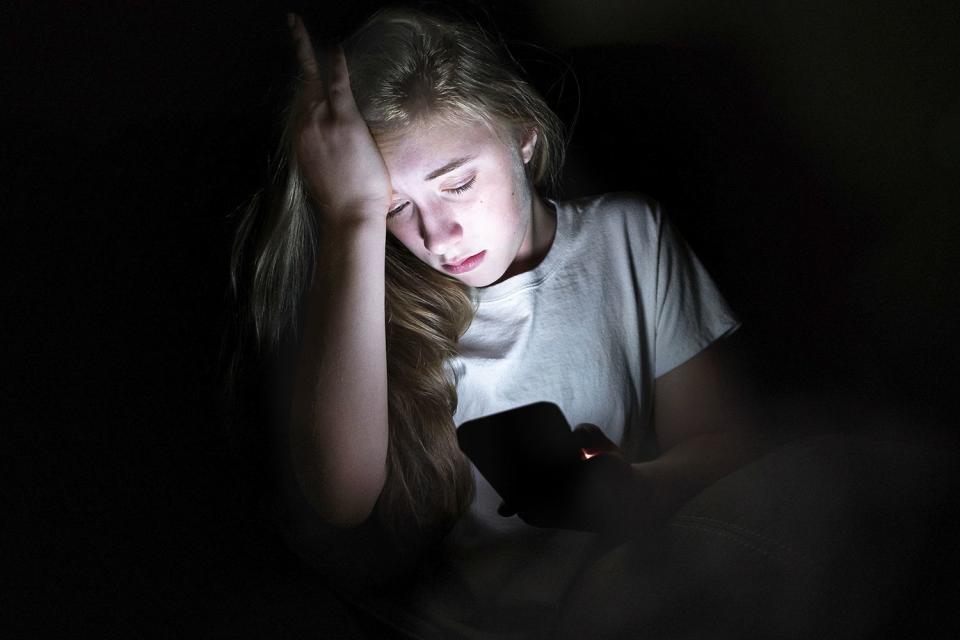Half of US Teens Say They've Experienced Cyberbullying — What Parents Need to Know
"Mediatrician" Dr. Michael Rich of the Boston Children's Hospital's Digital Wellness Lab on how parents can help their teens navigate online abuse and communicate better with friends

A recent survey by the Pew Research Center found that nearly half of all U.S. teens (46 percent) —and 54 percent of teenage girls ages 15 to 17—say they've experienced some form of cyberbullying. One in three teen girls say they've had false rumor spread about them online and more than a third say they've been called offensive names. About one in six teens reports that they use their phone nine hours or more per day, but many parents don't know what their kids are doing online, says pediatrician Dr. Michael Rich, a Harvard Medical School professor known as "The Mediatrician" and founder of the Digital Wellness Lab. He answered questions about how parents can help teens navigate online communication and abuse.
What is cyberbullying?
There's cyberbullying, and then there's teen drama. Bullying is using the online space to harass, threaten, coerce or put fear into the heart of someone else. The difference between teen drama and actual cyberbullying is intent. But for some kids intent doesn't matter. For them it's hurtful regardless.
Why can communicating online rather than in person cause hurt feelings?
If you shoot something off on your phone, what's lost is an immediate response in terms of facial expression or body language. A friend may send something thinking he or she is teasing another friend, but when it's received four hours later—and the mood is different—it's hurtful. Kids on both ends of that communication need to be aware of how it might be received.
How do girls experience cyberbullying differently?
Cyberbullying is much more prevalent among girls than among boys. And that's because traditional girl bullying is psychological warfare, and traditional boy bullying is physical warfare. The online space is one of psychological warfare.
How can parents know if their kid is experiencing bullying or teen drama?
It's a continuum rather than a cutoff. It's not like there's a tipping point where all of a sudden it's bad. The key thing is to keep communication open with your kid. We need to parent kids in their digital lives, not to discipline them or punish them but to guide and mentor them—and to be available when they are in a situation that they can't quite figure out.
Are monitoring apps a good way for parents to keep track of kids' online behavior?
Monitoring apps don't work, because kids hack around everything. What happens is the parent puts on the app and says, "Everything's cool now." And they stop paying attention. That breaks the cardinal rule of "stay in connection with your kids." We've made the mistake of treating smartphones like toys and not as the power tools they are. When our kids start driving, we don't just toss them the keys. We sit next to them, white-knuckled in the front seat, as they learn. And yet we don't do the same with smartphones even though they can be just as lethal.
What should parents do if their child is a victim of online bullying?
The important thing is helping your kid feel confident in sharing what's going on — even if they're not sure something bad is going on — and depressurizing the situation. There's a wide gray area of is this drama or is this bullying? And in many ways, it helps not to label it bullying, but to leave it in the drama space. Not to normalize it or say it's okay, but say, "Let's see this as a problem that we can solve together."
And what if you discover your kid has been bullying someone else or sending inappropriate content?
Make sure you know what's going on, and that you have the full story. I try to help kids walk in each other's shoes, as in, "How would you feel if you — or your little sister or brother — received this text or this image?" It's really about engendering their native empathy. Kids are, by their very nature, empathetic, but a lot of what they do in school and other places teaches them to compete. And sometimes teaching competition suppresses or blocks that empathy. I try to pull that empathy back out. This is not about punishment. Punishment for bullying, reiterates bullying. This is about saying, "What kind of world do you want? And how can you help make it that world?"
How can parents help their kids be better at online communication?
Kids need to be aware of the digital footprint they're creating for the future. They may think something is funny, edgy, cool at one point, but it could be hurtful to others, and it could hurt them in the future when they're applying to college, for example. I tell them that what they put online goes far, goes fast, and is sticky. In other words, it's going to stick somewhere essentially forever, or you have to assume that it can. So that they need to know from the get go that they are building their personal reputation. Have your kid build in a pause before anything is sent — image or text. Imagine being face-to-face with that person. One of the things that I recommend to patients is, when you're thinking of reaching out to someone, try to upgrade by one. Instead of tweeting, text, instead of texting, call. Better yet, video call. And best of all, get together in person. Parents can also go to the Digital Wellness Lab and use our Family Digital Wellness Guide as a resource.
For more People news, make sure to sign up for our newsletter!
Read the original article on People.

